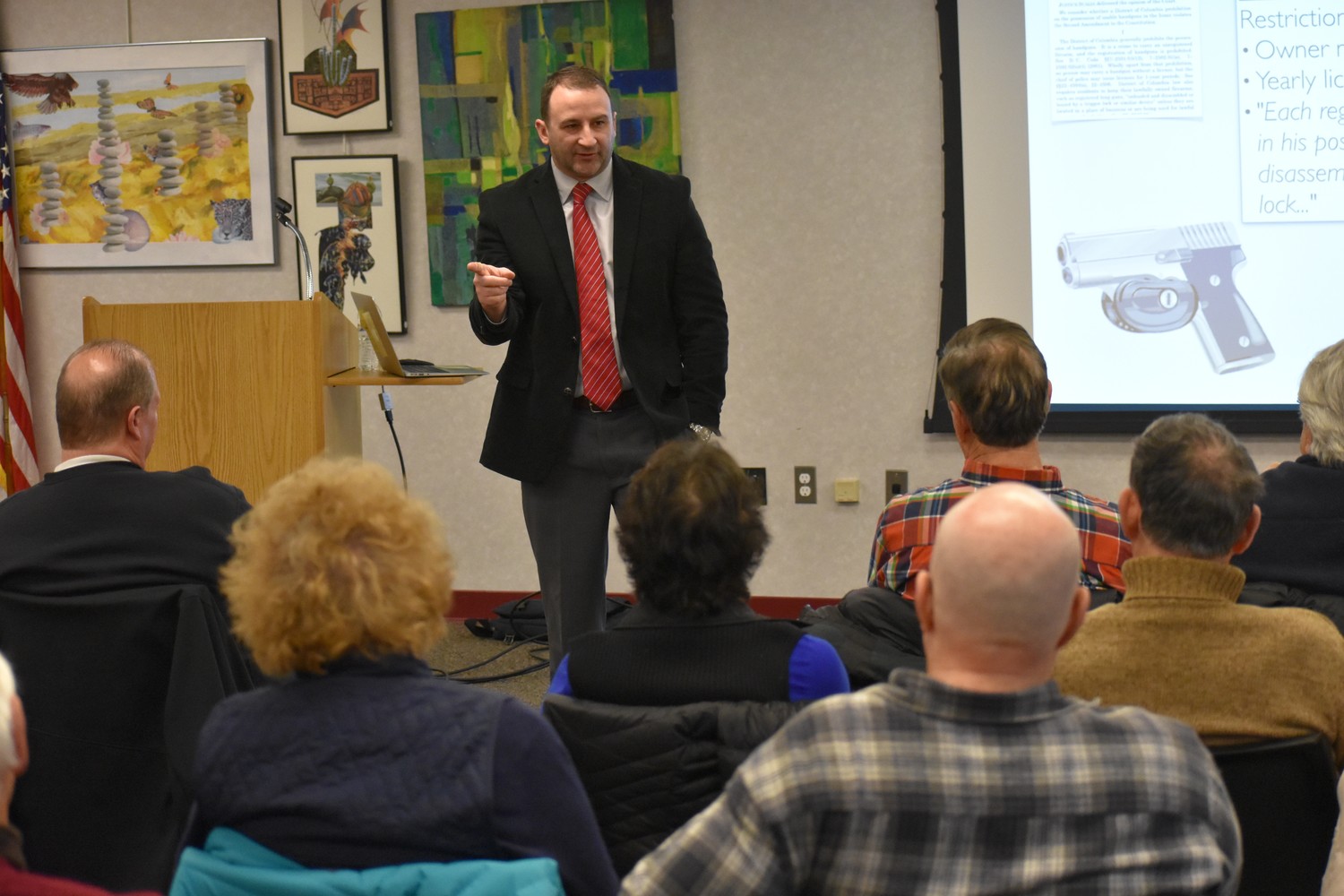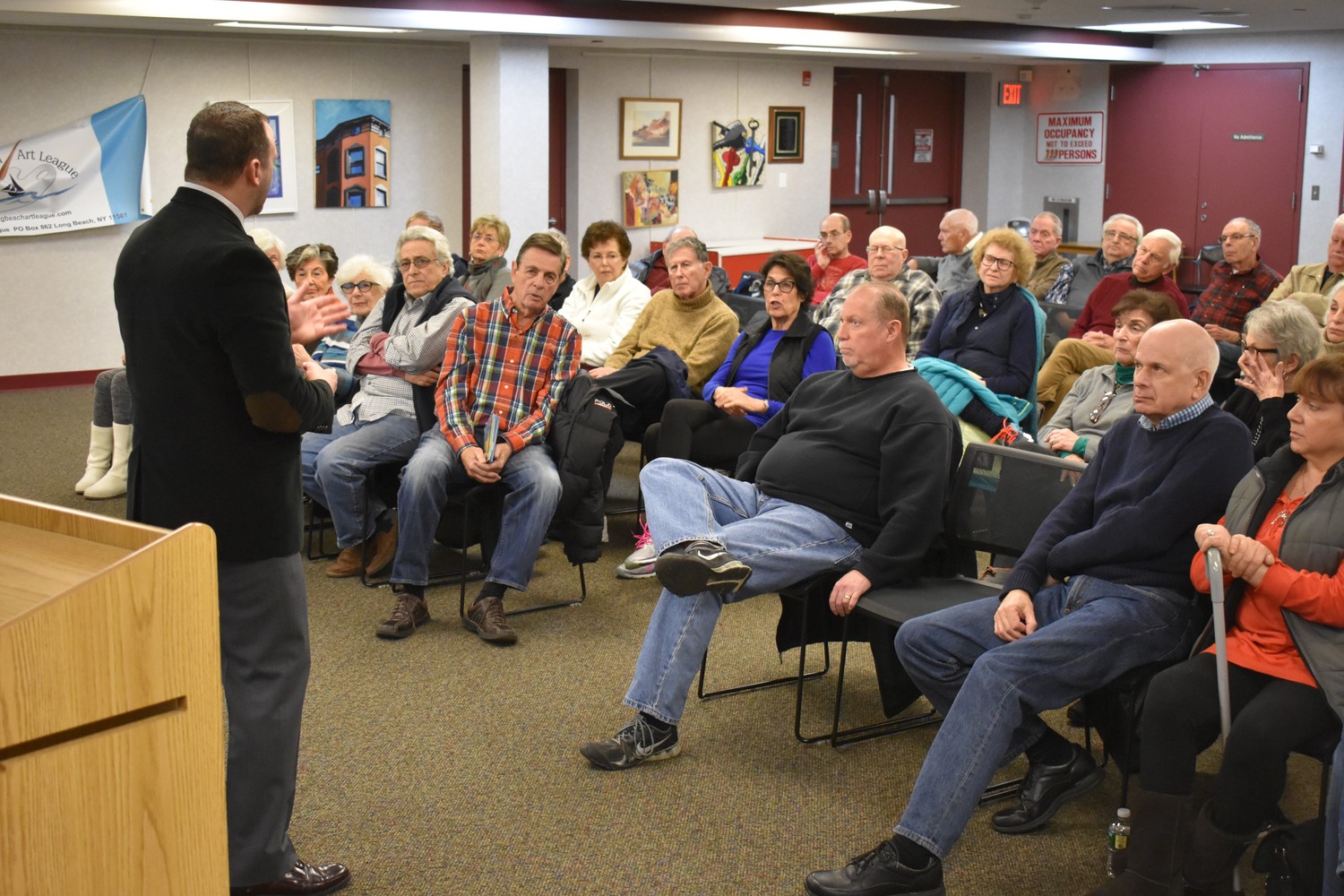Sunday, October 13, 2024
Lecture in Rockville Centre hones in on the Second Amendment
“The news always seems to give us some sort of conversation to talk about related to the Constitution,” James Coll told a crowd in the basement of the Rockville Centre Public Library on Jan. 18. “…The one we decided to talk about today is not controversial at all.”
The several dozen in attendance broke out in laughter.
Coll, of Seaford, a 20-year detective in the New York City Police Department who teaches American Constitutional history at Nassau Community College and Hofstra University, led a discussion about the Second Amendment — “A well regulated Militia, being necessary to the security of a free State, the right of the people to keep and bear Arms, shall not be infringed.”
Much of the 90-minute discussion revolved around breaking down the amendment’s 27 words, contemplating through historical analysis whether it represents an individual right to bear arms, or that right only under the condition of connection to serving in a militia, the definition of which was analyzed.
“The words are there to support both arguments,” Coll said, “hence a 235-year debate over what this actually says.”
He added: “While we can discuss and debate what the Second Amendment means, what it says, what it should mean, what is little to debate is what the Supreme Court said out of an opinion that came out 10 years ago this year.”
Dick Anthony Heller, a D.C. special policeman, applied to register a handgun he wished to keep at his home, but the District of Columbia refused, due to the Firearms Control Regulations Act of 1975, which banned unregistered handgun possession, requiring gun holders to receive one-year licenses and to keep firearms unloaded and dissembled or bound by a trigger lock.
In 2008, Heller filed a suit, claiming that parts of the law violated the Second Amendment. “Dick Heller wants to own a firearm to protect his family…” Coll explained. “Washington D.C. … [has] a responsibility to make sure that the people are safe. When these two really good motives come in contact with each other, we get a really good case out of the Supreme Court.”
The District Court dismissed the suit, but the D. C. Circuit reversed the decision.
The Supreme Court ruled in favor of Heller, 5-4, upholding that the Second Amendment protects an individual right to possess a firearm unconnected with service in a militia, and to use that weapon for traditionally lawful purposes, such as self-defense within the home. “What are the words of four justices?” Coll said to the attendees. “Words. What are the words of five justices? The law.”
The Court’s opinion noted that the decision should not cast doubt on various longstanding gun regulations, such as keeping firearms out of the hands of felons and the mentally ill, or bringing them to places such as schools and government buildings.
“When I ask where we are today,” Coll said, “the answer is, well we’re figuring out what are reasonable regulations.”
He stimulates everybody and we look forward to all of his [discussions],” Rockville Centre resident Sam Levin said of Coll. “I believe that we should be allowed to have arms to protect ourselves and it’s got to be very carefully regulated,” he continued, adding that children must be protected from guns.
“Why people need to defend themselves against the government is illogical,” Ali Soucy, also of Rockville Centre, told the Herald. “We’re not going to rise up as a group against the government.”
In his final points, Coll warned against supporting executive actions involving gun rights, like Barack Obama’s, saying, “If the process allows for those types of executive orders related to rights that we have in the Constitution, then they allow for other executive orders for other rights that you might not want.” He added that a national policy on guns would most likely mirror less strict gun regulations like in Texas, and that gun control advocates should look instead to the state for change.
“I think you’re able to see both sides of the argument and you understand the evolution of where we are today,” Lynbrook resident Michael Racanelli said of the Second Amendment. “It doesn’t make me feel any better, because the problem is still severe.”
HELP SUPPORT LOCAL JOURNALISM
The worldwide pandemic has threatened many of the businesses you rely on every day, but don’t let it take away your source for local news. Now more than ever, we need your help to ensure nothing but the best in hyperlocal community journalism comes straight to you. Consider supporting the Herald with a small donation. It can be a one-time, or a monthly contribution, to help ensure we’re here through this crisis. To donate or for more information, click here.
Sponsored content
Other items that may interest you







